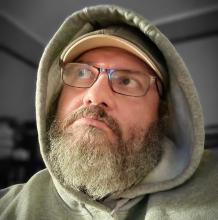Three Questions with Benjamin Linzy

Meet Benjamin Linzy, Humanities Without Walls program coordinator, based at Marquette University in Milwaukee, Wisconsin. Linzy works with Associate Director Maggie Nettesheim-Hoffmann on career diversity initiatives for the consortium, including programmatic development and implementation for the career diversity summer workshop.
Linzy is also the Senior Researcher at Marquette's Center for Urban Research, Teaching & Outreach (CURTO). In this role, he assists the Director with CURTO’s primary research agendas. He also serves as the host and producer of CURTO Conversations, the Center’s podcast, and he is the Budget and Grants Manager for CURTO's Educational Preparedness Program which provides academic support and career-building resources for incarcerated and recently released students. His research through CURTO centers around the topics of community policing, white nationalism, and state violence.
My official title is Program Coordinator for Career Diversity, and I work out of Marquette University with the Associate Director of Career Diversity. That is a fancy way of saying that my role is helping navigate the internal and external bureaucratic sea that comes with cross-institutional collaboration. My job is to work behind the scenes with our partners to ensure the mission is accomplished with as little stress to our community as possible.
What are the challenges and opportunities that exist when implementing humanistic programs and workshops on other campuses? How does cross-institutional collaboration work best?
The primary challenge is that the systems don’t talk to each other. It can be something as simple as a different term for a process to something as complex as an institution not having the capacity to process certain types of transactions. Magnifying this is that many of our consortia partners are in different states and, therefore, have different state-level rules and regulations their institutions must adhere to.
"The opportunity that exists in this is that it allows me to constantly evaluate the processes at my institution and ask the most complicated question: “Why are we doing it this way?” - Benjamin Linzy
Often, the answer is either because we always have or no one in their current positions knows. In partnering with other staff members from across the institutional spectrum, we often overcome institutional inertia and allow people to work together without the systems getting in the way. In my opinion, that is where the magic happens when professors, students, and community partners can collaborate in a space not constrained by constitutionalism.
What do you enjoy most about supporting career diversity opportunities in the humanities?
Philosophically or practically? Philosophically, it is doing my small part to push back on the anti-intellectual movement within the country at this moment in time. We need a greater diversity of voices in the public sphere, and expanding the space for PhDs to work outside of academia does this. It allows us to align our commitments to our professional aspirations holistically and (hopefully) more fulfilling than earning a paycheck typically is. Practically, it is the people who I get to work with, whether it is my wonderful colleagues at HWW, or the three cohorts of Career Diversity Fellows during the Summer Workshop I’ve had the pleasure of interacting with, or the faculty and staff at the various institutions I’ve been lucky enough to work with and learn from. There is joy in seeing people achieve their goals, especially if you have been able to contribute in some small way.
Published on December 7, 2023.